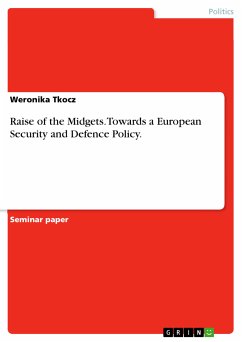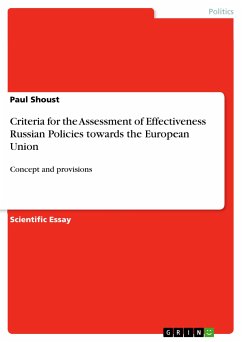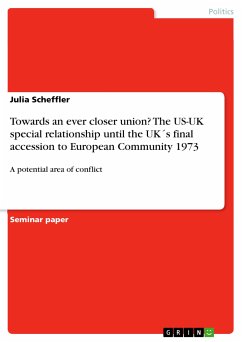Seminar paper from the year 2003 in the subject Politics - Region: Western Europe, grade: 1,3 (A), Free University of Berlin (OSI - Otto Suhr Institute for Political Science), course: HS 15075 »The Big Council:The Post-Nizza-Trail European Union, language: English, abstract: In 1998, JAN ZIELONKA, professor at the European University of Florence, declared that the Common European Foreign and Security Policy, established in 1991, failed. Furthermore, he found that the European Union should perceive itself as a "civic power" and not try to enter the field of common defence nor grasp the honour of leading the European security matters (ZIELONKA: 1998). The arguments he presented were very interesting and, over all, quite convincing. But, what happened in the following few months was the complete opposite of what he assumpted. Later that year, the most important sceptic of the European integration in security and defence matters, Great Britain, broke its 'splendid isolation'. The UK signed (together with its traditional "political opponent", France) the 'Saint Malo' declaration about cooperation in creating a common European Defence. Within one year, the 15 states of the EU grounded the European Security and Defence Policy during their official summits, unofficial meetings, and bilateral agreements - something they had not been able to create in the forty-years long history of the European integration. Regarding security matters, the European Union is very heterogeneous inside and it will be even more after the near eastern enlargement. The ESDP is organised between both NATO and WEU members, the NATO and non-WEU member Denmark and the 'neutral and notallied' ones (see Diagram). That means, that the ESDP is partly inside NATO and the WEU, partly only within NATO and partly completely outside. As LOTHAR RÜHL noticed (RÜHL: 1999, pp. 8-10) - the whole construction was narrower than NATO (before the 1999 enlargement) where only Turkey, Norway, and Iceland were both outside the EU and the WEU. Apart from that amusing "tongue twister", this heterogeneous structure reflects remarkably in the ESDP policymaking.
Dieser Download kann aus rechtlichen Gründen nur mit Rechnungsadresse in A, B, BG, CY, CZ, D, DK, EW, E, FIN, F, GR, HR, H, IRL, I, LT, L, LR, M, NL, PL, P, R, S, SLO, SK ausgeliefert werden.









